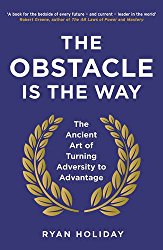In the meantime, cling tooth and nail to the following rule: not to give in to adversity, not to trust prosperity, and always take full note of fortune’s habit of behaving just as she pleases.
Perceptions can be managed. Actions can be directed.
We can always think clearly and, respond creatively. Looks for opportunity, seize the initiative
– Ryan Holiday, The Obstacle is the Way, p. 123
As I made clear in a previous post, some people do not plan for success and that should form part of any goal. However, sometimes it is best to not succeed. Better lessons are learned from failure than success.
We can not control what happens to and around us, mostly. What we can do is control our responses to what happens to us.
Get a yellow card even though you won the ball and the guy dived? See it as a lesson learnt about how far your opponent is willing to go to win (a la Sergio Ramos in the 2017 Champions League Final) and an opportunity to practice some virtue – accepting that bad things happen and some humility.
Lose a game by a heavy margin? See it as a wake up call; an opportunity to knuckle down, take a look at your tactics and your attitude.
Drop points you shouldn’t have or break a winning streak? See it as a blip. Don’t lose focus. Just say, as Steven Gerrard (in a slightly different context) once did,
“This is gone!.. We go again!”
It’s an indefinitely malleable formula: every locked door presents us an opportunity to find a work around that increases our skill and creativity; a work-around.
Josh Waitzkin, chess International Master, subject of the book and movie ‘Searching For Bobby Fisher, martial art Taiji Push Hands (Taiji Tui Shou) world champion and author of The Art of 
The first time we were staying in a little cottage… and he was trying to get in one door. He couldn’t, but he could get in the other door, and I said, “Jack, go around.” He looked at me and he went around.
The ‘go around’ became language for us, in terms of solving puzzles and in terms of any time you run into an obstacle. Working with the metaphor of ‘gokin around’ opened up this way that we could just have dialogue around connecting things – taking away a principle from one thing and applying it to something else – and we’ve had a lot of fun with that.
Listen to The Tim Ferris and Josh Waitzkin podcast “via iTune by clicking here.
If someone wrongs you, there is a chance to practice forgiveness. If you lose your job, now you can learn to practice acceptance, austerity and being frugal. If there is nothing you can do to help yourself, try to help other.
As Duke Ellington once said,
Problems are a chance for us to do our best
We must be willing to gamble on life and risk the chance of not succeeding
We all have the ability to give it our best, and what ever happens, be ready to accept the outcomes, learn from it and take the next step to being better and ultimately be an achiever.
The path of least resistance is a terrible teacher. We can’t afford to shy away from the things that intimidate us. We don’t need to take our weaknesses for granted
– Ryan Holiday, The Obstacle is the Way, p. 138
Go get at it!
Scott


